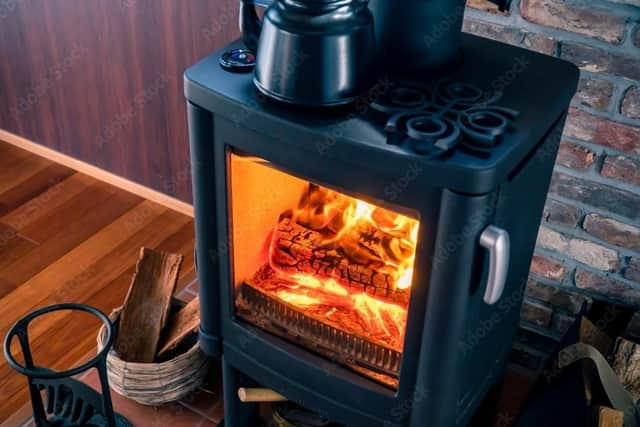Wood burner ban Scotland: Calls to ban stove fuels in bid to prevent pollution-related diseases
A lung and asthma charity is calling for a Scottish ban on certain log burner fuels in a bid to reduce pollution-related diseases.
Asthma + Lung UK Scotland is calling for tighter regulations of wood burning stoves and for the Scottish Government to increase public awareness of the pollutants associated with domestic burning.
Advertisement
Hide AdAdvertisement
Hide AdAccording to the charity, air pollution from wood burning has steadily increased in the past 30 years, “to the point where it is now the second largest source of fine particulate matter (PM2.5) pollution in Scotland”.


Particulate matter (PM2.5) consists of fine particles that, once in the air, are harmful to human health. These are particles with a diameter of less than 2.5 micrometres that can penetrate deeper into the lungs, the heart and blood stream.
Exposure has been linked to the increased likelihood of developing lung and heart conditions, cancer, strokes, mental health issues and dementia.
Across the UK, there has been an 89 per cent increase in PM2.5 emissions from wood burning as a fuel between 2010 and 2021, according to statistics published by the UK Government.
Joseph Carter, head of Asthma + Lung UK Scotland, said: “The idea of a cosy wood burning stove in the winter might sound appealing, but burning wood in our homes could be putting ourselves and our neighbours at risk and is a really inefficient way of heating a home. Burning wood is a source of air pollution both inside and outside homes, particularly PM2.5, which is the most dangerous pollutant to human health.
“The vast majority of stoves are being installed in areas with access to mainline gas supplies for secondary heating sources. Most people see them as a green alternative to coal or gas, and are unaware of the dangers, both for them and for their neighbours, of the air pollution it can cause.
“That is why we’re calling on the Scottish Government to provide the general public with more education about the dangers of air pollution, including the dangers that domestic wood burning can cause to people’s health.”
Asthma + Lung Scotland is calling for the Government, alongside health and environmental agencies, “to deliver a national awareness campaign to set out clear advice about domestic burning” and a ban on the sale of the most polluting fuels such as house coal and wet wood.
Advertisement
Hide AdAdvertisement
Hide AdThe charity also wants a nationwide scrappage scheme for the most inefficient wood burner.
Liz Mason, an 81-year-old woman from Perthshire who was diagnosed with bronchiectasis nine years ago, said: “There are three wood burners in houses either side of me. Every time they are on, which is usually in the autumn and winter months, and the smoke pollutants start to fill the air, my bronchiectasis flares up and I begin to wheeze and cough.
“I know it is hard at the moment with people struggling with the cost of living and looking at alternative ways of heating their homes, but maybe people just aren’t aware of the health issues surrounding burning wood.”
The Scottish Government has been contacted for comment.
Comments
Want to join the conversation? Please or to comment on this article.